- Back to Home »
- Egypt to Morsy: You need to go
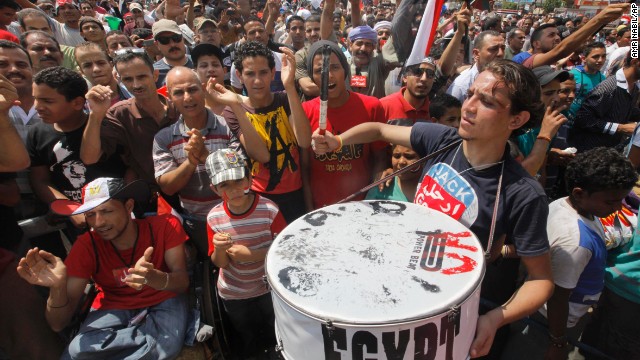 Egyptian protesters shout slogans and wave national flags during a demonstration against President President Mohamed Morsy in Tahrir Square in Cairo on Monday, July 1. Pro- and anti-government protests have spread around the country surrounding the one-year mark of Morsy coming into office on Sunday, June 30.
Egyptian protesters shout slogans and wave national flags during a demonstration against President President Mohamed Morsy in Tahrir Square in Cairo on Monday, July 1. Pro- and anti-government protests have spread around the country surrounding the one-year mark of Morsy coming into office on Sunday, June 30. 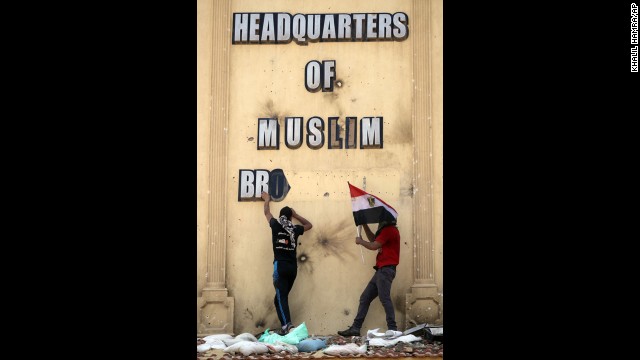 Egyptian protesters ransack the Muslim Brotherhood headquarters in the Muqatam district in Cairo on July 1. Protesters stormed and ransacked the headquarters of Morsy's Muslim Brotherhood group early Monday.
Egyptian protesters ransack the Muslim Brotherhood headquarters in the Muqatam district in Cairo on July 1. Protesters stormed and ransacked the headquarters of Morsy's Muslim Brotherhood group early Monday. 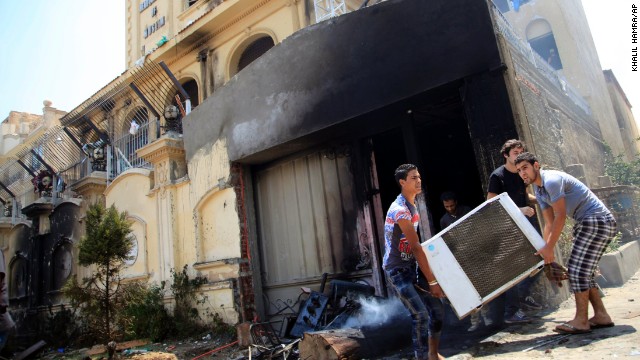 Egyptian protesters ransack the Muslim Brotherhood headquarters in Cairo on July 1.
Egyptian protesters ransack the Muslim Brotherhood headquarters in Cairo on July 1. 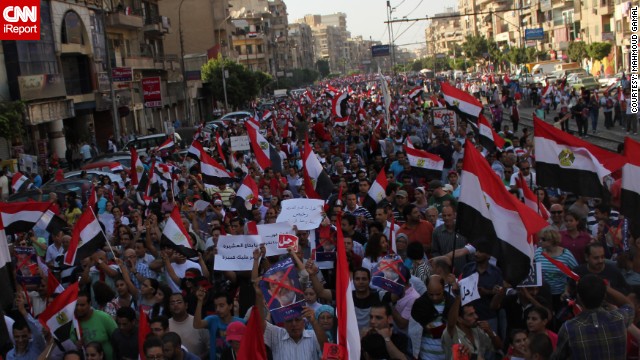 iReporter Mahmoud Gamal attended Sunday's protests in Cairo against President Mohamed Morsy and his government. His photos capture the vibrancy of the protests -- from a dog wearing an anti-Morsy shirt to protesters waving red cards like referees in a football game, calling on Morsy to resign.
iReporter Mahmoud Gamal attended Sunday's protests in Cairo against President Mohamed Morsy and his government. His photos capture the vibrancy of the protests -- from a dog wearing an anti-Morsy shirt to protesters waving red cards like referees in a football game, calling on Morsy to resign. 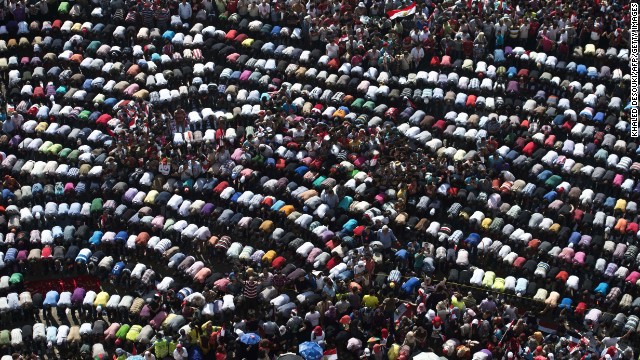 Thousands of opponents of Egyptian President Mohamed Morsy pray during a protest calling for his ouster at Cairo's landmark Tahrir Square on June 30. On the first anniversary of his inauguration, Morsy's Islamist supporters vow to defend his legitimacy to the end.
Thousands of opponents of Egyptian President Mohamed Morsy pray during a protest calling for his ouster at Cairo's landmark Tahrir Square on June 30. On the first anniversary of his inauguration, Morsy's Islamist supporters vow to defend his legitimacy to the end.  Egyptian protestors direct laser lights on a military helicopter flying over the presidential palace in Cairo. This is the biggest protest Egypt has seen since the 2011 revolt.
Egyptian protestors direct laser lights on a military helicopter flying over the presidential palace in Cairo. This is the biggest protest Egypt has seen since the 2011 revolt. ![<a href='http://ireport.cnn.com/docs/DOC-997886'>iReporter Maged Eskander </a>was also in Cairo Sunday afternoon and captured these images of protesters outside the presidential palace, where demonstrators calling for the ousting of President Mohamed Morsy had gathered. "[There were] songs from houses, flags from balconies [and] fireworks," he said. "People were happy, the numbers were huge and filling more and more streets." He says protesters hope the marches will bring "hope again to all Egyptians ... not to one group."](http://i2.cdn.turner.com/cnn/dam/assets/130701120934-egypt-june-30-ireport-horizontal-gallery.jpg) iReporter Maged Eskander was also in Cairo Sunday afternoon and captured these images of protesters outside the presidential palace, where demonstrators calling for the ousting of President Mohamed Morsy had gathered. "[There were] songs from houses, flags from balconies [and] fireworks," he said. "People were happy, the numbers were huge and filling more and more streets." He says protesters hope the marches will bring "hope again to all Egyptians ... not to one group."
iReporter Maged Eskander was also in Cairo Sunday afternoon and captured these images of protesters outside the presidential palace, where demonstrators calling for the ousting of President Mohamed Morsy had gathered. "[There were] songs from houses, flags from balconies [and] fireworks," he said. "People were happy, the numbers were huge and filling more and more streets." He says protesters hope the marches will bring "hope again to all Egyptians ... not to one group." 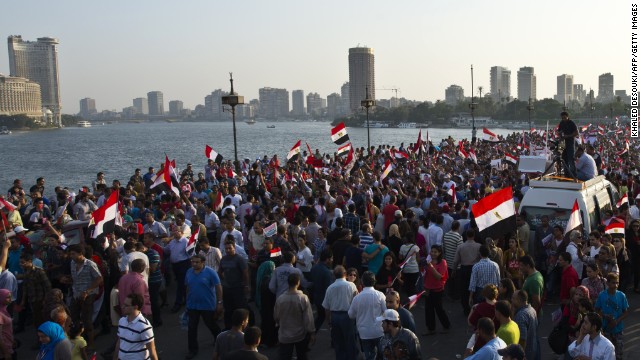 Opponents of Morsy march on the Qasr el-Nil bridge leading to Tahrir Square.
Opponents of Morsy march on the Qasr el-Nil bridge leading to Tahrir Square. 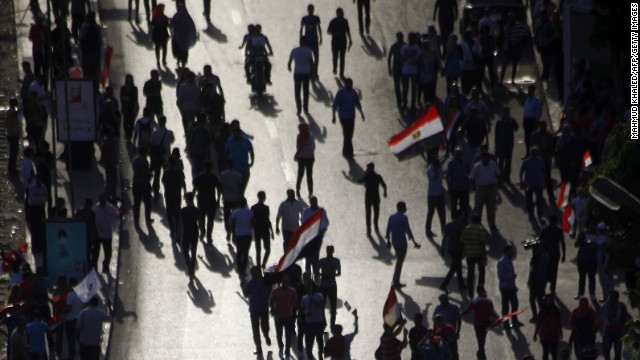 Protesters have given the country's first democratically elected president one day to step down from office.
Protesters have given the country's first democratically elected president one day to step down from office. 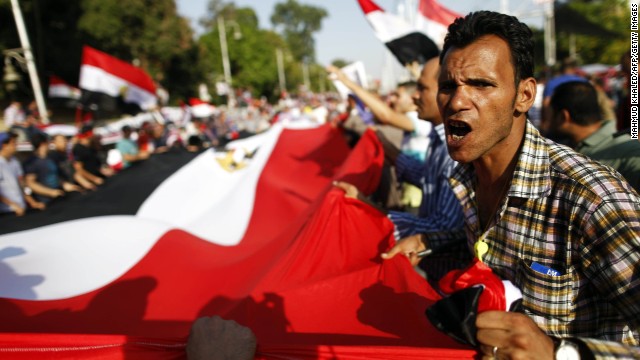 In a statement posted Monday on its official Facebook page, Tamarod (the "rebel" campaign) demanded that if President Mohamed Morsy doesn't leave office by Tuesday, the group will begin a civil disobedience movement, call for nationwide protests and march on the presidential palace, where Morsy's administration is running affairs.
In a statement posted Monday on its official Facebook page, Tamarod (the "rebel" campaign) demanded that if President Mohamed Morsy doesn't leave office by Tuesday, the group will begin a civil disobedience movement, call for nationwide protests and march on the presidential palace, where Morsy's administration is running affairs. 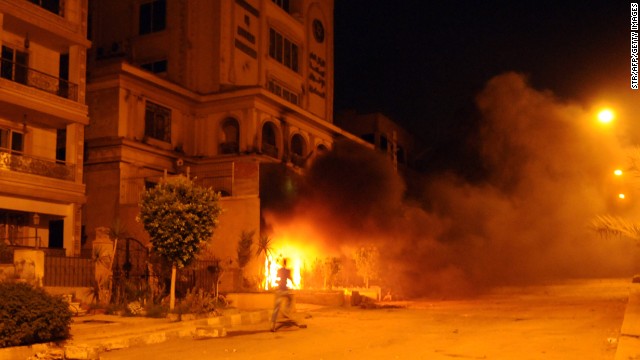 Protesters stormed the main headquarters of the Muslim Brotherhood in Cairo, the party that Morsy led before his election, and set it on fire on June 30.
Protesters stormed the main headquarters of the Muslim Brotherhood in Cairo, the party that Morsy led before his election, and set it on fire on June 30. 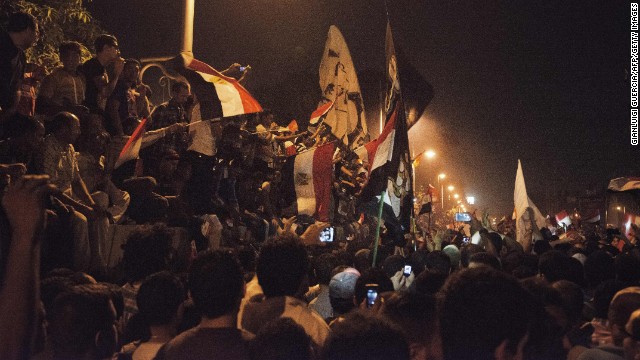 At least 16 people were killed and more than 780 were wounded Sunday and Monday during the unrest in Egypt, the nation's health minister said, according to the official Egypt News agency.
At least 16 people were killed and more than 780 were wounded Sunday and Monday during the unrest in Egypt, the nation's health minister said, according to the official Egypt News agency. 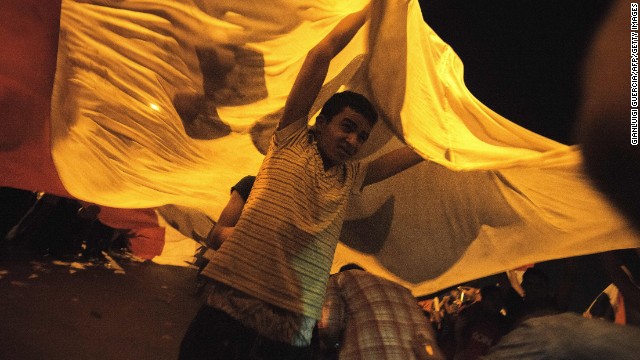 Those calling for Morsy's ouster say he has hijacked the gains made in the revolution that toppled Hosni Mubarak and has pushed aside moderate voices.
Those calling for Morsy's ouster say he has hijacked the gains made in the revolution that toppled Hosni Mubarak and has pushed aside moderate voices. ![<a href='http://ireport.cnn.com/docs/DOC-998115'>iReporter and photographer Hasan Amin </a>captured images of the crowd of protesters marching against President Mohamed Morsy in Cairo, Egypt. "It was positive, a lot of Egyptians went to protest for the first time," he said. "They have faith that they can change [things] and that their fate is in their hands."](http://i2.cdn.turner.com/cnn/dam/assets/130701123534-egypt-irprt-hasan-amin-horizontal-gallery.jpg) iReporter and photographer Hasan Amin captured images of the crowd of protesters marching against President Mohamed Morsy in Cairo, Egypt. "It was positive, a lot of Egyptians went to protest for the first time," he said. "They have faith that they can change [things] and that their fate is in their hands."
iReporter and photographer Hasan Amin captured images of the crowd of protesters marching against President Mohamed Morsy in Cairo, Egypt. "It was positive, a lot of Egyptians went to protest for the first time," he said. "They have faith that they can change [things] and that their fate is in their hands." 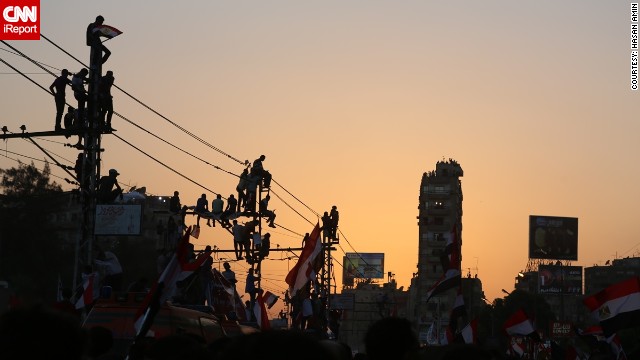 The crowds, Hasan Amin said, were huge, and gathered all around the city's presidential palace, metro stations and streets. "They all were united on one demand -- Morsy to step down," he said. Please be warned one of these images contains a swear word.
The crowds, Hasan Amin said, were huge, and gathered all around the city's presidential palace, metro stations and streets. "They all were united on one demand -- Morsy to step down," he said. Please be warned one of these images contains a swear word. 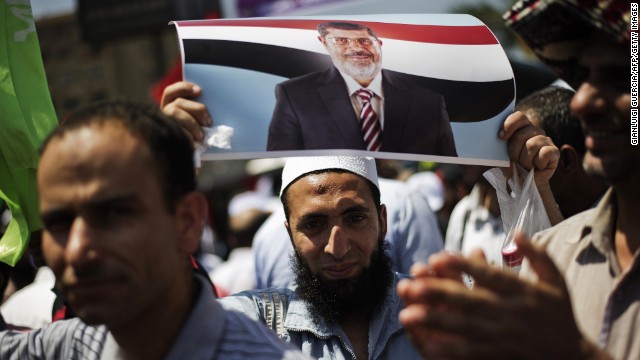 An Egyptian protester holds a picture of President Mohamed Morsy as Islamists and Muslim Brotherhood supporters gather at the Rabaa al-Adawiya mosque to start an open-ended sit-in in support of Morsy's legitimacy in Cairo on June 28, 2013.
An Egyptian protester holds a picture of President Mohamed Morsy as Islamists and Muslim Brotherhood supporters gather at the Rabaa al-Adawiya mosque to start an open-ended sit-in in support of Morsy's legitimacy in Cairo on June 28, 2013. 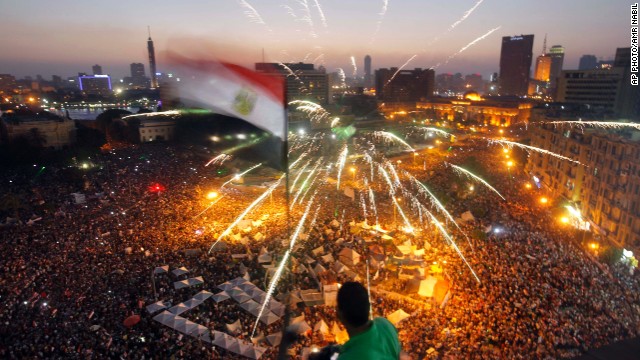 Morsy's opponents say his policies are to blame for a breakdown in law and order, for an economy that's gone south, and for a gas shortage that has Egyptians waiting at the pumps for hours.
Morsy's opponents say his policies are to blame for a breakdown in law and order, for an economy that's gone south, and for a gas shortage that has Egyptians waiting at the pumps for hours. 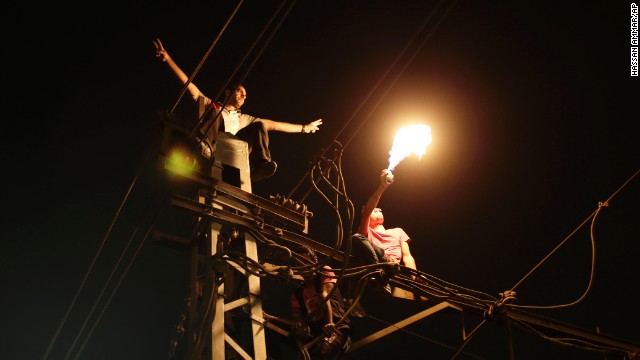 Protesters sit on top of a power pole as they chant slogans against Morsy outside the presidential palace in Cairo on June 30. "Egypt is on the brink of a volcano," government-run newspaper Al-Akhbar said.
Protesters sit on top of a power pole as they chant slogans against Morsy outside the presidential palace in Cairo on June 30. "Egypt is on the brink of a volcano," government-run newspaper Al-Akhbar said. 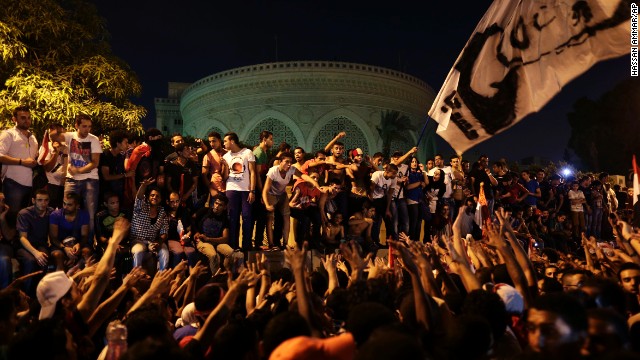 Periodically, Morsy opponents and supporters have clashed and the results have been deadly -- even before the Sunday clashes.
Periodically, Morsy opponents and supporters have clashed and the results have been deadly -- even before the Sunday clashes. 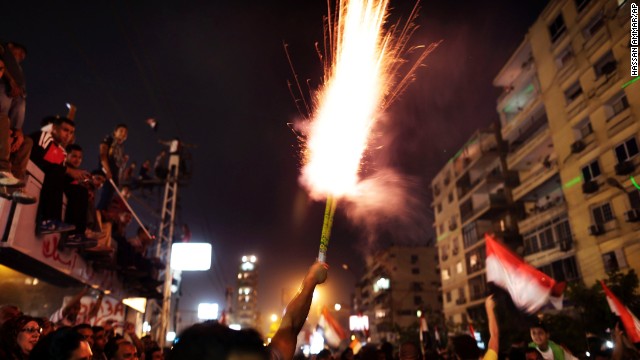 Protesters set off fireworks outside the presidential palace.
Protesters set off fireworks outside the presidential palace. 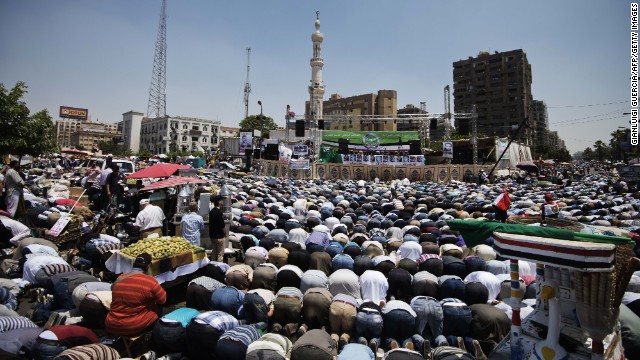 Thousands of Muslim Brotherhood supporters conduct Friday prayers in front of a Cairo mosque before the start of a sit-in for Morsy on June 28.
Thousands of Muslim Brotherhood supporters conduct Friday prayers in front of a Cairo mosque before the start of a sit-in for Morsy on June 28. 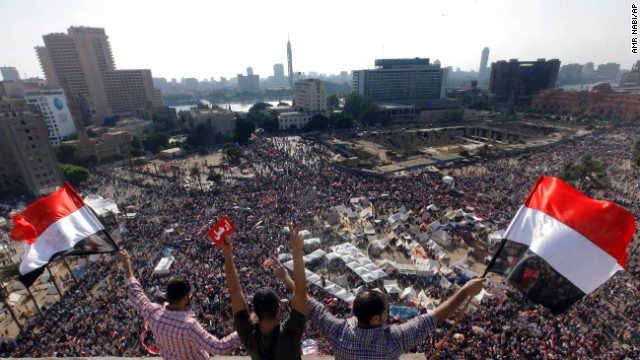 Protesters wave national flags and a red card in Arabic reading "leave" in Tahrir Square during the demonstration against Morsy.
Protesters wave national flags and a red card in Arabic reading "leave" in Tahrir Square during the demonstration against Morsy. 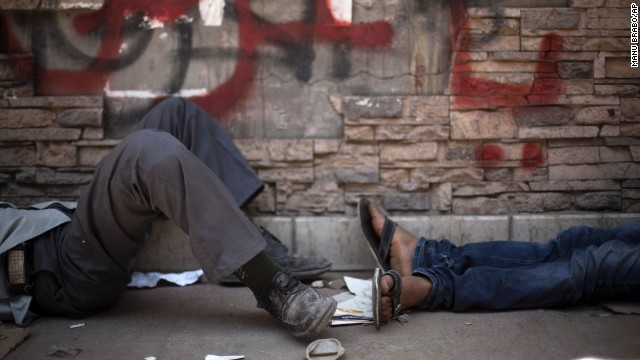 Protesters take a rest near Tahrir Square. Those supporting the president say he is the people's choice and refer to the 13 million votes he earned in elections held exactly a year ago Sunday. They say he inherited a broken system and should be given time to fix it.
Protesters take a rest near Tahrir Square. Those supporting the president say he is the people's choice and refer to the 13 million votes he earned in elections held exactly a year ago Sunday. They say he inherited a broken system and should be given time to fix it. 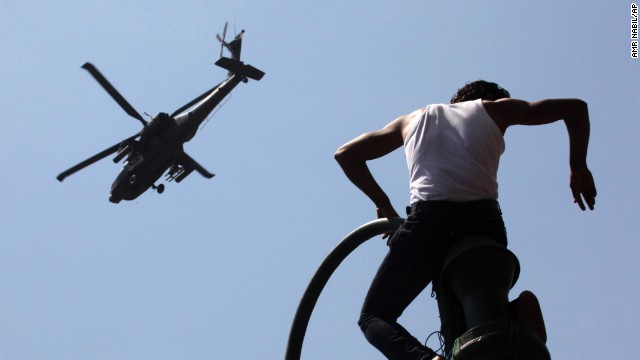 A protester watches an Apache helicopter as it flies over Tahrir Square on June 30. Morsy's opponents stood their ground in the square, where protests two years ago helped topple Hosni Mubarak's 29-year rule.
A protester watches an Apache helicopter as it flies over Tahrir Square on June 30. Morsy's opponents stood their ground in the square, where protests two years ago helped topple Hosni Mubarak's 29-year rule. 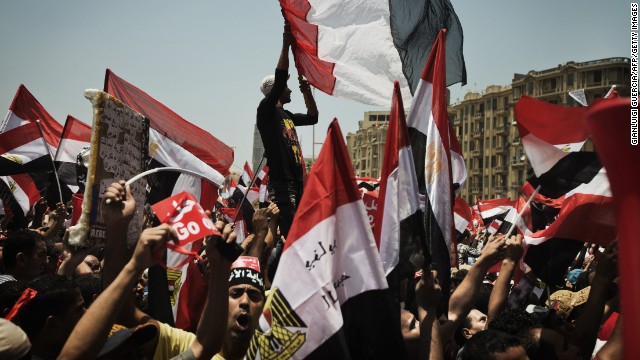 The demonstrators say they have collected 17 million signatures -- roughly 4 million more than what won Morsy the presidency -- and all of them call for Morsy to go.
The demonstrators say they have collected 17 million signatures -- roughly 4 million more than what won Morsy the presidency -- and all of them call for Morsy to go. 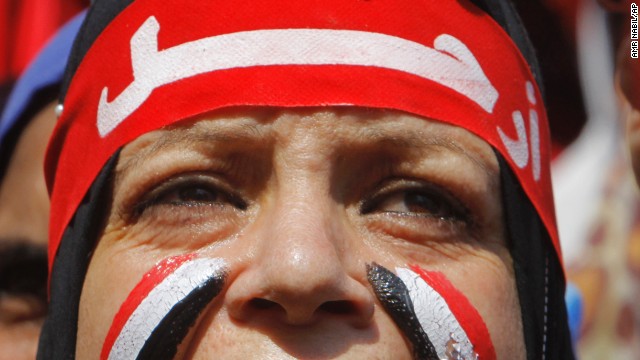 An Egyptian protester chants slogans during the rally.
An Egyptian protester chants slogans during the rally. 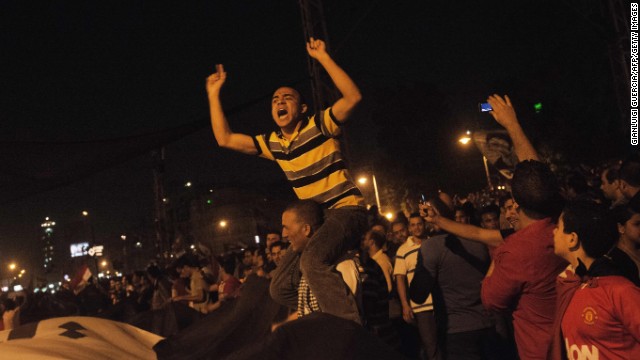 Hundreds of thousands of Morsy opponents chant outside the presidential palace.
Hundreds of thousands of Morsy opponents chant outside the presidential palace. 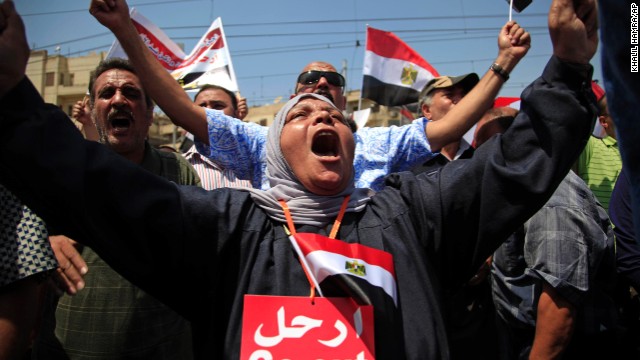 Morsy opponents protest outside the presidential palace in Cairo on June 30.
Morsy opponents protest outside the presidential palace in Cairo on June 30. 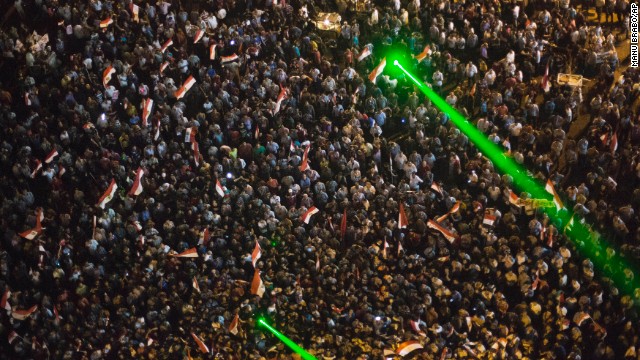 Thousands of Egyptian protesters gather in Tahrir Square. Anti-Morsy protesters have a wide range of views on why he should go and how to eject him from office.
Thousands of Egyptian protesters gather in Tahrir Square. Anti-Morsy protesters have a wide range of views on why he should go and how to eject him from office. 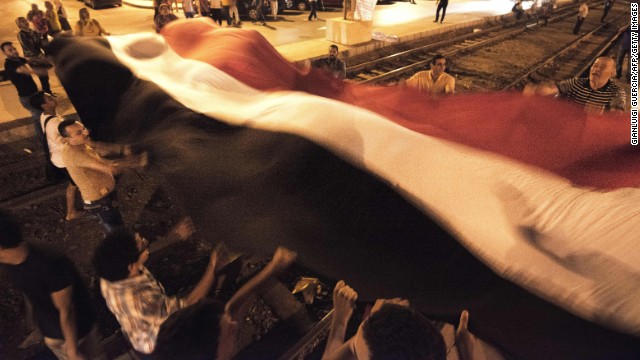 Morsy opponents wave a giant national flag outside the presidential palace on Saturday, June 29.
Morsy opponents wave a giant national flag outside the presidential palace on Saturday, June 29. 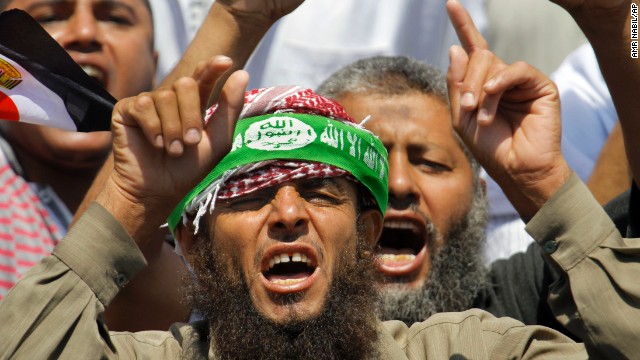 Supporters of the president shout slogans at the opposition near a mosque in Cairo on June 29. "We're not leaving, and the president is staying," one supporter told CNN. "We believe in democracy. If people don't like him, they can vote him out in three years."
Supporters of the president shout slogans at the opposition near a mosque in Cairo on June 29. "We're not leaving, and the president is staying," one supporter told CNN. "We believe in democracy. If people don't like him, they can vote him out in three years." 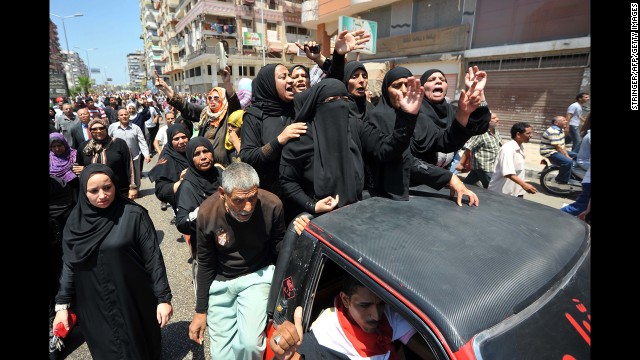 Mourners shout slogans during journalist Salah Hassan's funeral on June 29 in Port Said.
Mourners shout slogans during journalist Salah Hassan's funeral on June 29 in Port Said. 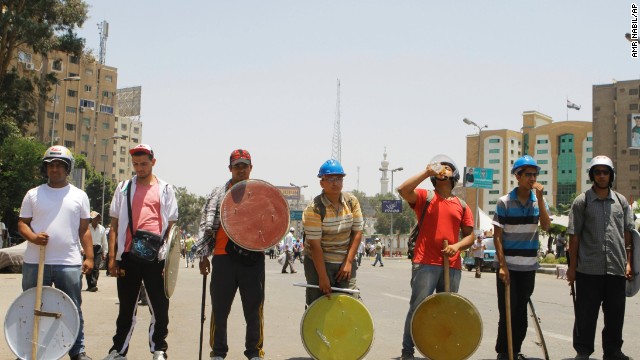 Morsy supporters, armed with sticks and shields, stand guard at their protest site in Cairo on June 29.
Morsy supporters, armed with sticks and shields, stand guard at their protest site in Cairo on June 29. 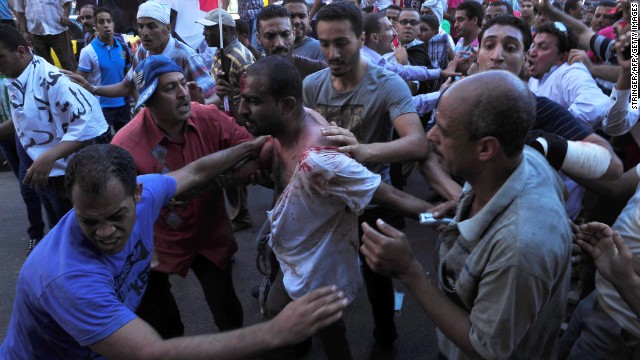 Egyptians help a wounded man following clashes between Morsy's supporters and opponents in Alexandria on June 28.
Egyptians help a wounded man following clashes between Morsy's supporters and opponents in Alexandria on June 28. 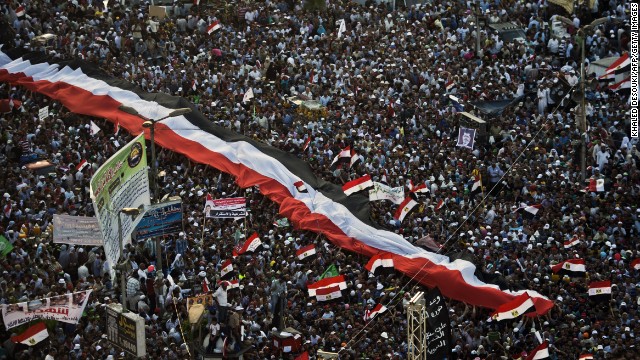 Morsy supporters demonstrate in Cairo on June 28. Protests have also erupted in Suez, Sharqia, El Monofia and Gharbiya, the state-run Ahram news agency said. And in the port city of Alexandria, so many people turned out that traffic virtually came to a standstill.
Morsy supporters demonstrate in Cairo on June 28. Protests have also erupted in Suez, Sharqia, El Monofia and Gharbiya, the state-run Ahram news agency said. And in the port city of Alexandria, so many people turned out that traffic virtually came to a standstill. 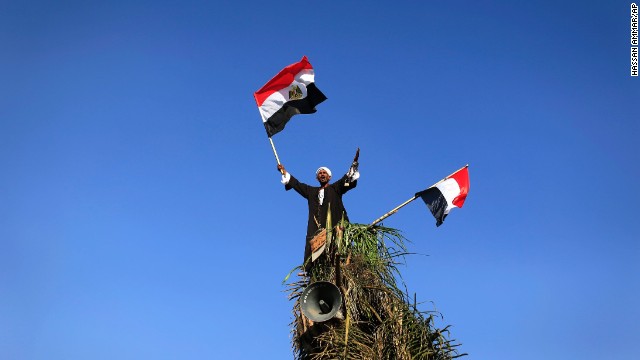 A Morsy opponent waves Egyptian flags during a protest outside the Egyptian Defense Ministry in Cairo on June 28.
A Morsy opponent waves Egyptian flags during a protest outside the Egyptian Defense Ministry in Cairo on June 28. 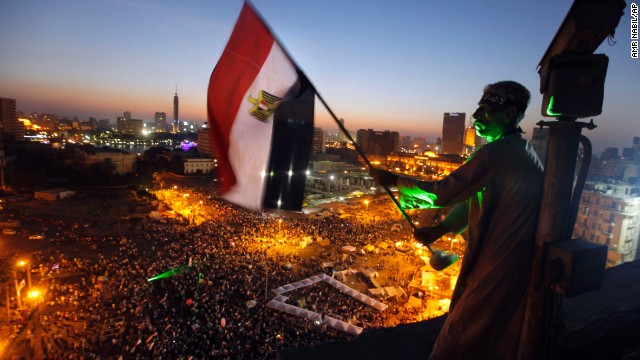 A protester waves a national flag over Cairo's Tahrir Square. Demonstrator Rifaat Ali traveled from Upper Egypt to the capital with a message to Morsy's opponents: "Our patience has run out. Either you back off, or the only thing left to do is attack with one fist."
A protester waves a national flag over Cairo's Tahrir Square. Demonstrator Rifaat Ali traveled from Upper Egypt to the capital with a message to Morsy's opponents: "Our patience has run out. Either you back off, or the only thing left to do is attack with one fist." 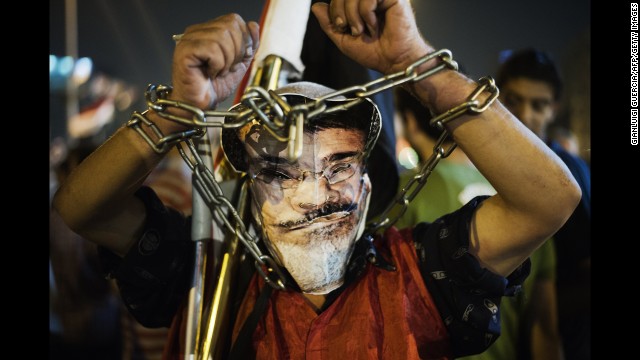 A chained protester wearing a picture of Morsy participates in an anti-government protest in Tahrir Square on Wednesday, June 26.
A chained protester wearing a picture of Morsy participates in an anti-government protest in Tahrir Square on Wednesday, June 26. 
1

2

3

4

5

6

7

8

9

10

11

12

13

14

15

16

17

18

19

20

21

22

23

24

25

26

27

28

29

30

31

32

33

34

35

36

37

38
- Millions take to the streets to protest against Egyptian President Mohammed Morsy
- Frida Ghitis: What's striking is the intensity of anger at the Muslim Brotherhood
- She says Egyptians realize that Morsy's government is not living up to its promises
- Ghitis: The discontent and protests show that Egypt's revolution is far from over
Editor's note: Frida Ghitis is a world affairs columnist for The Miami Herald and World Politics Review. A former CNN producer and correspondent, she is the author of "The End of Revolution: A Changing World in the Age of Live Television." Follow her on Twitter: @FridaGColumns.
(CNN) -- One of the most striking aspects of the massive protests that have broken out across Egypt is the intensity of the people's anger directed at the Muslim Brotherhood.
Welcome to the second wave of the Egyptian revolution.
Millions of people have poured onto the streets, marking the first anniversary of Mohammed Morsy's swearing-in as Egypt's president with a demand that he step down immediately and make way for new elections. If Morsy refuses, they plan a campaign of civil disobedience that could paralyze the country. Now the army has stepped in with an ultimatum, telling Morsy he has 48 hours to satisfy the protesters' demands.

The organizers, a group known as Tamarod or "rebel," say they have already collected 22 million signatures in support of their demands. That's far more than the 13 million votes Morsy -- the candidate of the Muslim Brotherhood -- received in the presidential election, and a sign that discontent has spread beyond the liberals, or former regime supporters.
The opposition's push for new elections has clearly capitalized on Morsy's dismal record, particularly on the economy's downward spiral and the chaotic security situation. But there's more to this protest than a call for jobs, bread and safe streets.
Underpinning the calls for change is a growing understanding of the meaning of democracy, and an increasingly pervasive sense that what Egypt has had under Morsy is not the system that Egyptians had in mind in 2011 when they overthrew a deeply entrenched dictatorship.
When Egyptians poured into the streets in early 2011, they wanted to topple Hosni Mubarak, the dictator who had ruled the country for three decades. They succeeded in ending dictatorship, but their revolution took a sharply different turn from the one envisioned by the young idealists who occupied Cairo's Tahrir Square.
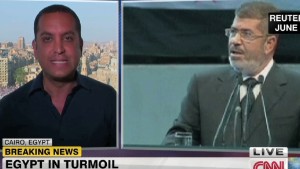 Egypt's military issues ultimatum
Egypt's military issues ultimatum 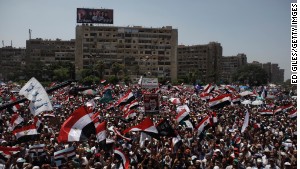 Anti-Morsy protests heat up in Egypt
Anti-Morsy protests heat up in Egypt  Egyptian protesters want Morsy out
Egyptian protesters want Morsy out 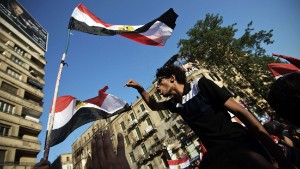 American killed in Egyptian violence
American killed in Egyptian violence Unlike the Brotherhood, Mubarak's rule had no overarching ideology other than cementing his hold on power. The Brotherhood, by contrast, has a distinct ideology, and it is moving steadily, if gradually, to put it into place. It essentially wants to use its interpretation of Islam as the guiding principle for the individual, society and the state. And it ultimately wants to unify all Muslim states into one, to "liberate them from foreign imperialism."
What happens to the Brotherhood in Egypt will affect Brotherhood parties across the region. Already its image of incompetence and noninclusiveness is a stain that will be difficult to erase.
In Egypt, Islamist parties quickly moved to the forefront of the post-Mubarak political scene. The Ikhwan, as the Brotherhood is known, had a head start in political organizing. It competed on a stage where other parties had barely taken shape, vying for voters who had practically no experience with democracy. Not surprisingly, the Brotherhood won every election, although its margin of victory steadily narrowed.
Liberal activists had struggled to explain to voters a number of basic democratic concepts, such as secularism, protection of minorities and rule of law.
Now Morsy and the Brotherhood have done Egypt a great service by demonstrating what these ideas mean.
Many Egyptian protesters accuse Morsy of governing for the benefit of the Muslim Brotherhood rather than for the country as a whole. A year under Morsy has shown some of the important yet subtle aspects of democratic rule, such as the fundamental concept that winning elections does not mean the winner gets to ignore all the concerns of the opposition.
The Brotherhood's intentions and Morsy's credibility started to become troubling when they repeatedly broke their word. They vowed not to field a candidate for president, not to seek to control the parliament, not to try to dominate the constitution-writing process. And they broke every promise.
Morsy's reputation took a steep dive after he seized dictatorial powers in November. The protests forced him to reverse course, but he failed to lead the country through its "Constitutional Moment," the pivotal period in history when it has the opportunity to reach a national consensus -- much more than an electoral victory -- to write a constitution that is embraced as legitimate by the nation as a whole.
Instead, Morsy and the Ikhwan have taken their thin electoral victory as justification for gradually expanding their hold on the country's institutions. They rammed through a constitution that does not provide a strong guarantee of equality for women and for minorities. They have allegedly worked to suppress critical media, allowed inflammatory speech against non-Sunni Muslims, and rejected all criticism as work of foreigners and "falool," as nostalgic remnants of the Mubarak dictatorship are known. They have gone after nongovernmental organizations, seeking to hollow out the influence of grass-root groups, particularly those working on democracy education.
Ironically, one year under a Muslim Brotherhood government has proven quite helpful in educating Egyptians about democracy.
Morsy and the Ikhwan have inadvertently helped explain how in a democracy, the rights and the voices of minorities, even of election losers, must be heard. They have unwittingly shed some light on the complicated concept of secularism. In the first wave of elections, many voters thought if they were Muslim -- as most Egyptians are -- they should vote for the Muslim Brotherhood. And they thought secular was synonymous with atheist. Now they're discovering how religion can be exploited for power.
Egyptians accuse Morsy and the Brotherhood of engaging in a process of "Ikhwaninzation," a quest to take control of state institutions and impose their Islamist views on the population.
Unfortunately for Morsy and the Brotherhood the protesters are more experienced this time around. Egyptians have learned that it's not enough to topple a dictator.
It is unclear where this second wave will lead. The opposition is still divided and its small component parts may still not be large enough to defeat an Ikhwan party in a new election. But the protests are a sign that the revolution is far from over, and this time its target is the Muslim Brotherhood.
Follow us on Twitter @CNNOpinion.
Join us on Facebook/CNNOpinion.
The opinions expressed in this commentary are solely those of Frida Ghitis.







